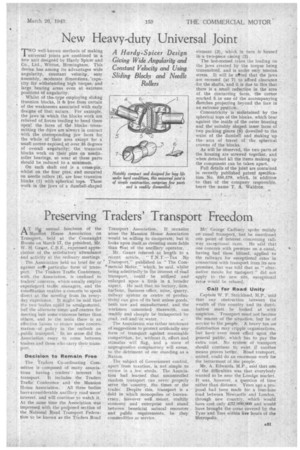Preserving Traders' Transport Freedom
Page 33

If you've noticed an error in this article please click here to report it so we can fix it.
AT tlif annual luncheon of the Mansion House Association on Transport, held at the Connaught Rooms on March 17, the president, Mr.
. W. H. Gaunt, C.B.E., expressed appreciation of the satisfactory attendance and activity at the ordinary meetings.
The Association held no brief for or against an particular form of transport. The Traders Traffic Conference, with the .ASsociation, is confined to traders' concerns, which usually employ experiepced traffic managers, and the constitution enables aconcern to speak direct at the meeting from its everyday experience. It might be said that the two bodies could De amalgamated, buf the alternate time amr centres for meeting °suit some concerns better than others, and in the main there is an effective liaison to ensure some concentration.' of policy in the outlook on . public transport. • In no sense did the Association essay to come between
' traders and those who carry their transport.
Decision to Remain Free The Traders Co-ordinating Committee is composed of many associations having traders' interest in transport. It includes the Traders Traffic Conference and the Mansion House Association. All three bodies havea considerable ancillary, road users' interest, and will continue to watch it. At the same time the Association was impressed with the proposed section of the National Road Transport Federation to be known as the Traders Road
Transport Association. If occasion
• arose the Mansion House Association would be willing to co-operate, but it looks upon itself, as cbvenng more fields than that of the ancillary operator. , Mr. Gaunt referred at length to a recent -article, , " T.N.T.—Tax No • Transport," published in "The Com
smercial Motor," Which, he said, whilst being admittedly-in the interest of load transport, could be utilized and enlarged upon a little in a broader aspect. He said that no factory, 1kII1, harbour, Business office, mine, quarry, railway system or centre of productivity can give of its best unless goods, both raw and manufactured, and the workmen concerned therewith, can readily and cheaply be transported by rbad, rail and/Or. water.
The Association was rather intolerant of suggestions to protect artificially any form of transport against reasonable competition, for, without it, effort and stimulus will Nag, and a state of unprogressive complacency will ensue, to the detriment of our standing as a. Nation.
The subject of Government control, apart from taxation, is not' simple to review in a few Words. The Association had learned that uncontrolled random transport can never properly serve the country, .the times or the trader. Despite this, transport is a Lfield in which monopolies or bureau ' cracy, however well meant, stultify economy and enterprise and stand between beneficial natural resources and public requirements, be they commodities or service.
Mr: George Cadbury spoke mainly on canal transport, but he mentioned one point of interest concerning railway exceptional rates. He said that one concern with premises on a canal, having had these blitzed, applied to the railways for exceptional rates in connection with transport from its new premises, but was told that as " alternative means for transport " did not apply to the new site, exceptional men would be refused.
.Call for Road Unity Captain W. F. Strickland, M.P., said that any obstruction between the wealth of this country and its distribution must be looked at with suspicion. Transport must not become the master of the sittjation, but be of service to the people. A heavy tax on distribution may cripple organizations, but have even More effect upon the general public, which has to pay the extra cost. No system of transport should continue to exist if another means proves better. Road transport, united, could do an enormous work for the betterment of the people.
Mr. A. Edwards, M.P., said that one, of the difficulties was that everybody wanted to be near the London market. It was, however, a question of time rather than distance. Years ago a proposal had been made for a four-lane road between Newcastle and London, through new country, which would have cost only £32,000,000 and would have brought the areas covered by the Tyne and Tees within five hours of the Metropolis.




















































